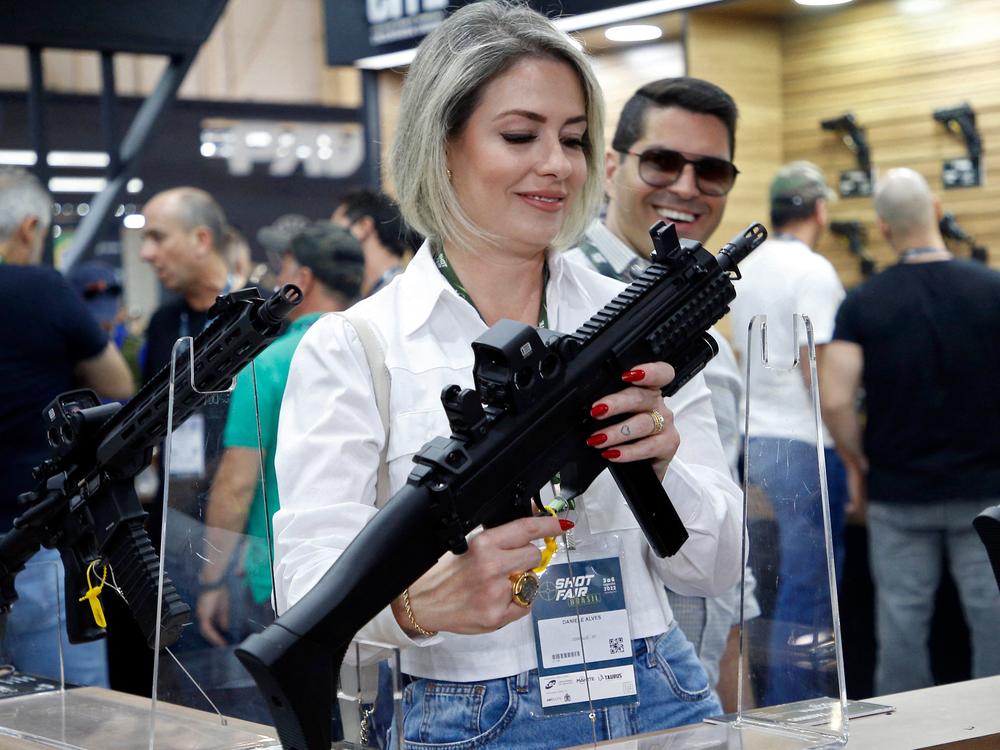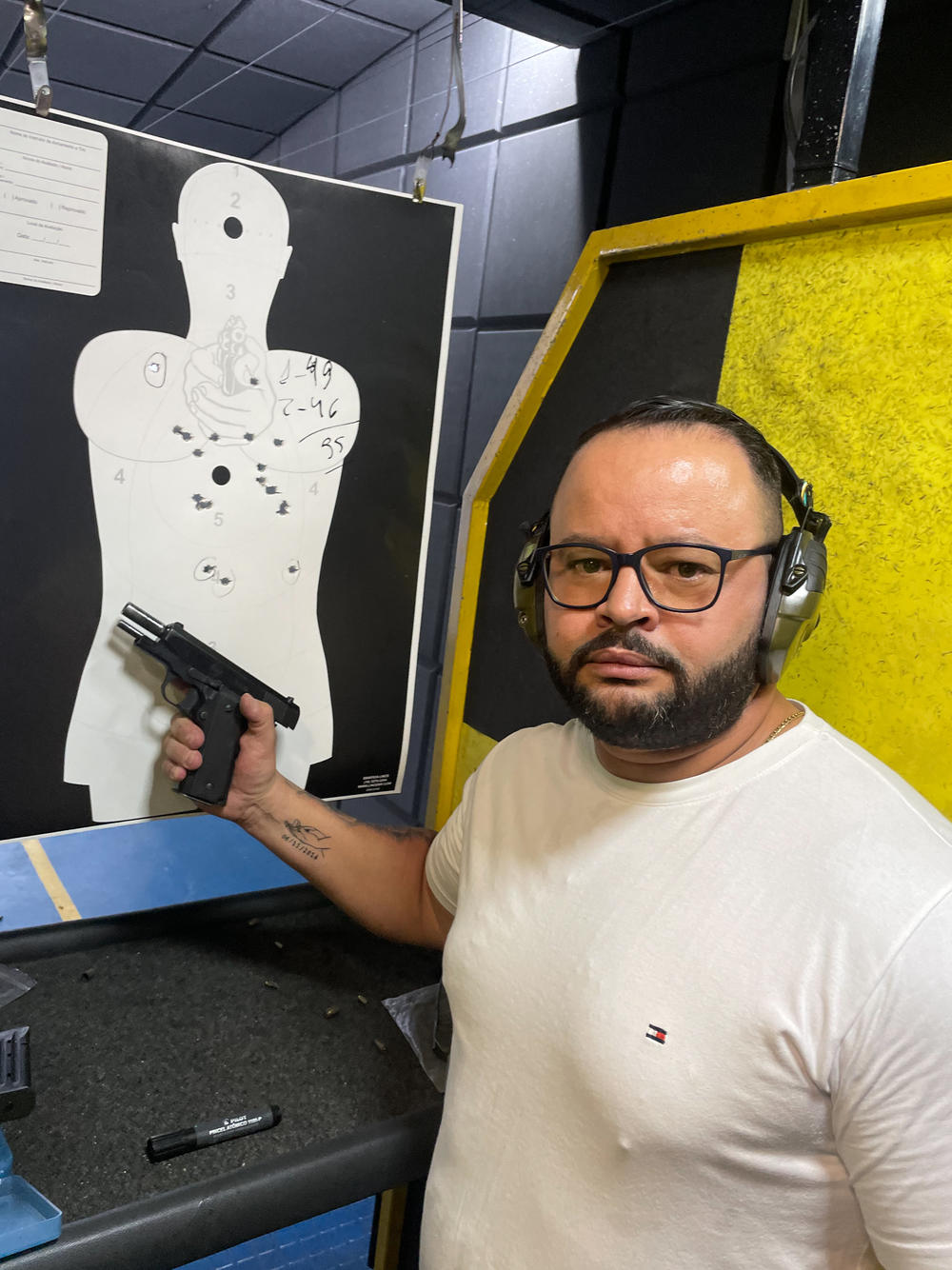Section Branding
Header Content
Brazil's firearm ownership booms, and gun laws loosen, under President Bolsonaro
Primary Content
RIO BONITO, Brazil — At a shooting range a man applying for a gun permit points a pistol and fires 10 shots at a human-shaped target 20 feet away. Nearly all the bullets hit the target's sweet spot in the middle of the torso.
The shooter, Wagner Carneiro, is a former Brazilian army sergeant. He explains that a man in a car asking for directions suddenly pointed a gun to his head and demanded his mobile phone. Now, the 40-year-old Carneiro wants a gun for himself.
"I need it to protect my family," he says, speaking from the range in the town of Rio Bonito, about 40 miles west of Rio de Janeiro.
Thanks to President Jair Bolsonaro, a right-wing populist whose hero is former President Donald Trump, it's become a lot easier for Brazilians like Carneiro to get guns. Since taking office in 2019, Bolsonaro has issued more than a dozen decrees loosening restrictions on gun ownership for civilians.
Bolsonaro, who faces a tough reelection battle in October, has avidly courted Brazil's growing gun lobby and often poses for photos making a gun sign with his thumb and forefinger.
"Expanding the right of the population to bear arms has been one of Bolsonaro's main electoral promises from day one," says Fábio Zanini, a columnist for Folha de S.Paulo, a leading Brazilian newspaper. "Gun owners are one of his main electoral bases."
There are still more gun regulations in Brazil than in the United States, including mandatory psychological and firearm safety exams. But now private citizens can buy more powerful handguns and ammunition and in greater quantities. Collectors and competitive shooters can purchase automatic rifles.
Since 2018, the number of guns in private hands has doubled to nearly 2 million, according to data from Brazil's army and police analyzed by Brazilian security think tank Sou da Paz.
Gun stores and shooting tournaments are popping up all over Brazil. They include the massive Schützenfest, held in southern Brazil where many people are of German descent, and is a combination of beer-drenched Oktoberfest and shooting guns. An average of one new shooting range per day has opened during Bolsonaro's nearly four years in office, Brazil's UOL website reported.
Some Brazilian gun enthusiasts mimic their American counterparts by talking about their "Second Amendment" rights, even though there is no constitutional right to bear arms here. Others, like Rodrigo Santoro, who is training to become a weapons instructor at the Rio Bonito shooting range, don't trust the police to protect them from well-armed criminals.
"The main principle is to defend yourself, your family, your home," he says. "We defend guns in the hands of the good people because the bad guys already have guns."
After President Bolsonaro, Brazil's highest-profile gun advocate, is his son, congressman Eduardo Bolsonaro. In July, he celebrated his 38th birthday with a cake decorated with a revolver. He claims that looser gun regulations have helped bring down Brazil's homicide rate.
"It was the biggest drop in murders ... since 1980," he told Tucker Carlson of Fox News in June. "So, Brazil is safer, thanks God, because of this policy."
But the country's homicide rate was on its way down even before Bolsonaro took office, says Bruno Langeani, the manager of Sou da Paz. And in spite of this trend, the murder rate here of over 22 killings per 100,000 people was still more than three times higher than in the U.S. in 2020, according to World Bank figures.
Cecília Olliveira, who directs Fogo Cruzado, a project that maps gun violence in Brazilian cities, says that instead of promoting gun ownership for self-protection, authorities should focus on reforming the police.
"When you [say]: 'I have to protect myself because the police are not working,' this is not right," she says. "The point is: We have to make the police work in the right way."
Mass shootings carried out by civilians in Brazil are rare. But rising gun ownership has led to more suicides and gun accidents involving children, says Langeani of the Sou da Paz think tank. In addition, he says drug-trafficking groups are recruiting civilians to legally purchase automatic rifles, which are then passed on to the criminals.
"We are seeing more and more episodes of what in the U.S. you would call 'straw buyer' purchase — diversion of firearms to crime," he says.
Ahead of October's election, polls show President Bolsonaro trailing left-wing candidate Luiz Inácio Lula da Silva. He's a former president who tightened Brazil's gun laws when he first took office in 2003. That legislation prevented ordinary citizens from purchasing guns while a buyback program led to the return of more than 700,000 firearms. Immediately afterwards, Brazil's homicide rate went down, though it started creeping back up in 2007.
So, the prospect that Lula, as the former president is widely known, could return to power has some Brazilians scurrying to apply for gun permits, says Alexandre Coelho, an instructor at the shooting range in Rio Bonito and an ardent supporter of Bolsonaro.
"Left-wing governments don't believe in the right to self-defense. They believe the state has to defend you and will always be [there] to defend you. That is a lie," he says. "Right-wing governments believe in the right to self-defense."
Among his clients is Carneiro, the man who was robbed at gunpoint for his cellphone and who is now finishing up his shooting test. As he examines the bullet holes in the target, Coelho is impressed.
"A total of 95 points" of a possible 100, he says. "He is approved."
Copyright 2022 NPR. To see more, visit https://www.npr.org.



